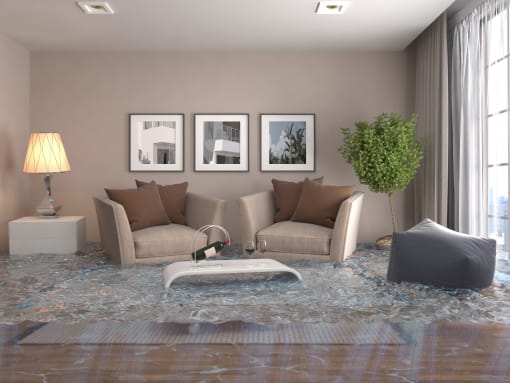How to prevent Water Damage? Tips to protect your residential property against them

For almost 10 years, water damage insurance claims have been on the rise. They now represent the most common type of damage suffered by residential property owners and managers. Whether due to flooding, plumbing failure or negligence, it’s important to take precautions to avoid damage that could be detrimental to both the building and its occupants.
Here are some examples of situations that can lead to water damage:
- Flooding as a result of aging city underground water mains (bursting and back-ups).
- Sewer back-up.
- Pipe bursting due to faulty workmanship of plumbing/lack of insulation.
- Bad sprinkler head management (accidental discharge due to human error).
- Failure of recirculation lines causing water damage.
- Window/door left open during cold temperatures leading to frozen and burst pipes.
- Accumulation of snow on roof melts and leaks into units.
- Faulty or poorly maintained building plumbing.
Even if some of these situations are beyond your control, you can still avoid several of them thanks to a number of prevention tools that can help you guard against such damage.
To mitigate your risks, make sure you maintain your equipment regularly and effectively and follow the recommendations below:
RESIDENCES (Building)
- Have a professional check your sewer system as soon as you notice signs of sewer back-up or an unusual odour.
- Clearly indicate where shut-off valves of all major sources of water are located in your dwelling and in units. This allows to shut off water supply quickly in case a problem arises and therefore minimize the risk of water damage.
- Check the condition of your building’s communal water heater, if any.
- Check eavestroughs for debris or blockage; ensure regular cleaning and maintenance procedures are in place.
- Have equipment on site and available to quickly evacuate and clean up water and limit damage (e.g., portable pump, shop-vac, etc.).
YOUR OCCUPANTS (Units)
Talk to your occupants about the importance of checking the following items on a regular basis and of contacting you if they notice any abnormalities or wear that could lead to leaks in their unit:
- Check the condition of caulking around doors, windows, or other wall penetrations such as plumbing and air conditioning units.
- Check the condition of all water seals and caulking in the kitchen and bathroom, such as the bathtub, faucets, showerhead, toilet, dishwasher, etc.
- Check the condition of rubber hoses connecting to washing machines; they tend to deteriorate rapidly and cause leaks.
- Inspect all plumbing pipes and fixtures around units for rust or corrosion.
- Turn off water supply at the main valve before leaving for an extended period or on vacation.
